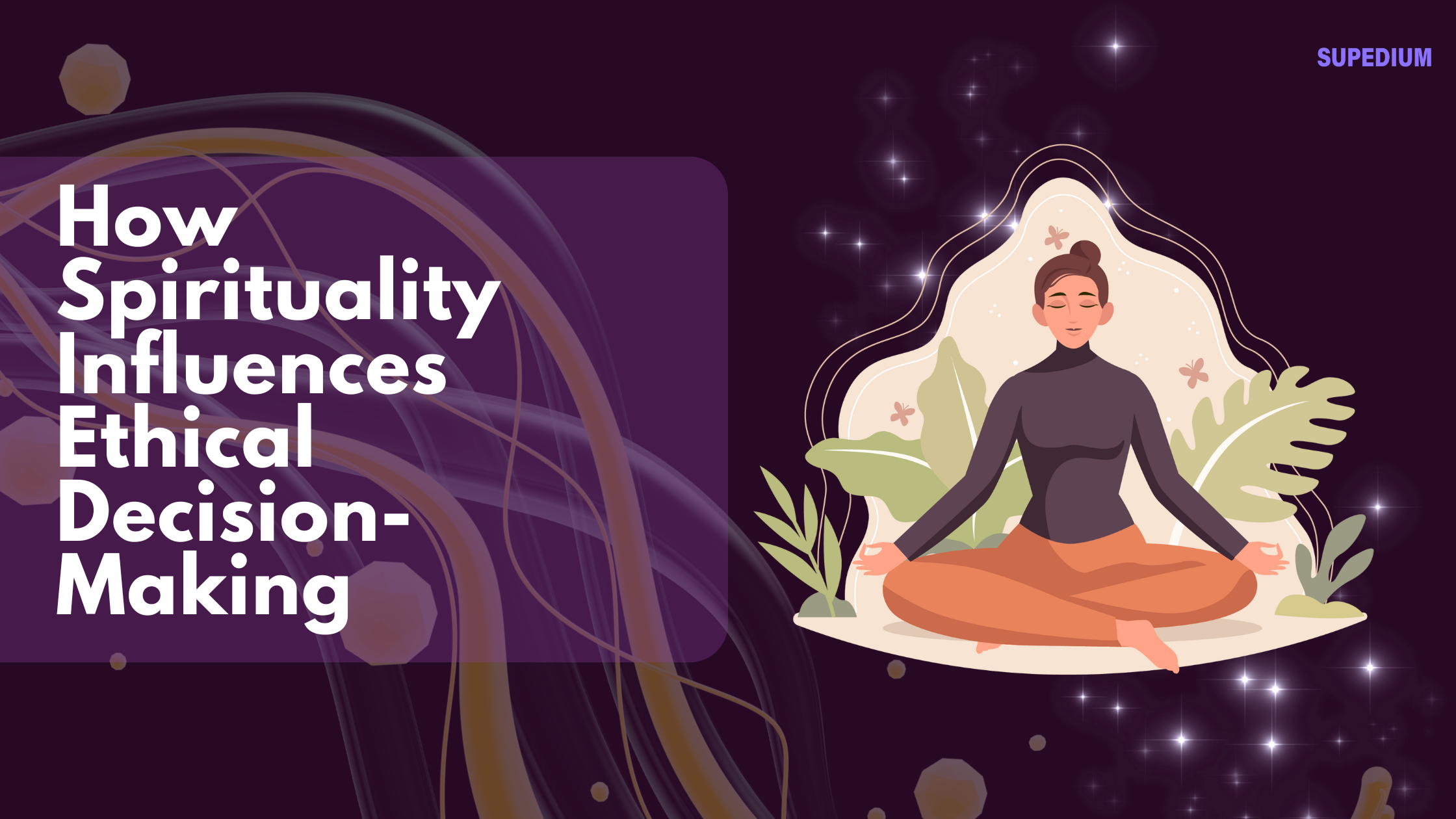Table of Contents
![]()
Spirituality and ethics are deeply intertwined, influencing how individuals navigate moral decisions in their personal and professional lives. While spirituality generally refers to personal beliefs and practices relating to a higher purpose or meaning, ethics involves the principles that guide our behavior. Understanding the impact of spirituality on ethical decision-making requires examining the underlying values, practices, and teachings that shape our moral judgments.
I. Introduction
A. Definition of Spirituality
Spirituality is a broad concept encompassing personal experiences and beliefs related to a higher power, universal connection, or inner self. Unlike organized religion, which has structured doctrines and practices, spirituality is often more individualized. It emphasizes a personal quest for meaning and connection, which can be expressed through various practices like meditation, prayer, and reflection.
B. Definition of Ethical Decision-Making
Ethical decision-making involves evaluating and choosing actions based on moral principles. It is crucial in shaping behavior in both personal and professional contexts, guiding individuals to act in ways that align with their values and societal norms. Ethical frameworks such as utilitarianism (focusing on the greatest good for the greatest number), deontology (following universal principles), and virtue ethics (developing moral character) provide different approaches to making ethical choices.
C. Purpose of the Outline
This article explores how spirituality influences ethical decision-making by examining spiritual values, practices, and teachings. It seeks to understand how spiritual beliefs can shape ethical judgments and the mechanisms through which spirituality impacts moral reasoning.
II. The Concept of Spirituality and Ethics
A. Spirituality
Spirituality often involves a sense of connection to something greater than oneself, whether that be a higher power, the universe, or a deeper sense of self. It can be experienced through personal practices such as meditation, prayer, and rituals, which help individuals explore their purpose and values. Spirituality tends to be subjective and personal, allowing for a diverse range of beliefs and practices.
B. Ethics
Ethics deals with the principles that guide human behavior, focusing on what is considered right or wrong. These principles can be influenced by cultural, social, and personal factors. Ethical decision-making involves applying these principles to navigate complex moral situations, often using frameworks like utilitarianism, deontology, and virtue ethics to guide choices.
III. Spirituality’s Influence on Ethical Decision-Making
A. Spiritual Values and Ethical Principles
Spirituality often emphasizes core values such as compassion, empathy, integrity, and respect. These values can profoundly impact ethical decision-making:
- Compassion and Empathy: Spiritual beliefs frequently encourage compassion and empathy, prompting individuals to consider the well-being of others in their decisions. For instance, many spiritual traditions advocate for treating others with kindness and understanding, which can lead to more ethical behavior in interpersonal interactions.
- Integrity and Honesty: Spirituality often stresses the importance of integrity and honesty, guiding individuals to act in ways that are true to their values and principles. This emphasis on personal integrity can lead to more consistent and ethical decision-making.
- Respect and Fairness: Spiritual teachings frequently highlight the importance of respect and fairness, encouraging individuals to make decisions that honor the dignity and rights of others. This can influence ethical choices by promoting fairness and equitable treatment.
B. Influence of Spiritual Practices
Spiritual practices such as meditation, prayer, and rituals can influence ethical decision-making by fostering a deeper sense of self-awareness and moral clarity:
- Meditation and Mindfulness: Regular meditation and mindfulness practices can enhance self-awareness and emotional regulation, helping individuals approach ethical dilemmas with a clearer, more balanced perspective. This can lead to more thoughtful and compassionate decision-making.
- Prayer and Reflection: Prayer and reflective practices often involve seeking guidance from a higher power or inner self, which can provide insights and clarity in making ethical choices. This spiritual guidance can help individuals align their decisions with their values and beliefs.
- Rituals and Community Involvement: Engaging in spiritual rituals and participating in spiritual communities can reinforce ethical norms and values. Community support and shared practices can provide a sense of moral guidance and accountability.
C. Spiritual Teachings and Ethical Guidelines
Different spiritual traditions offer various teachings and guidelines that can inform ethical decision-making:
- Religious Texts and Spiritual Philosophies: Many spiritual traditions have foundational texts or philosophies that outline ethical principles. For example, the Bhagavad Gita, the Bible, and the Quran provide moral guidance that influences followers’ ethical decisions.
- Moral Teachings from Spiritual Traditions: Each spiritual tradition offers unique perspectives on ethical issues. For instance, Buddhism emphasizes non-violence and compassion, while Christianity highlights love and forgiveness. Comparing these teachings can reveal how spirituality shapes ethical perspectives.
IV. Mechanisms of Influence
A. Personal Transformation
Spirituality can lead to personal transformation by shaping one’s moral character and values. Individuals who engage deeply with their spiritual beliefs may experience shifts in their priorities and ethical outlook, resulting in more consistent and principled decision-making.
B. Perception of Moral Dilemmas
Spiritual beliefs can frame how individuals perceive and approach moral dilemmas. Spiritual perspectives may provide different interpretations of ethical issues, influencing moral reasoning and judgment. For example, a spiritual view that emphasizes interconnectedness may lead to a greater focus on communal well-being in decision-making.
C. Community and Social Influence
Spiritual communities often play a significant role in shaping ethical behavior by establishing social norms and expectations. Participation in spiritual groups can reinforce ethical values and provide support for making moral choices. This communal influence can enhance ethical decision-making by fostering a shared sense of responsibility and accountability.
V. Case Studies and Examples
A. Historical Examples
- Influence of Spiritual Leaders: Figures such as Mahatma Gandhi and Martin Luther King Jr. exemplify how spiritual beliefs can shape ethical leadership. Gandhi’s commitment to non-violence and King’s advocacy for civil rights were deeply influenced by their spiritual principles.
- Spiritual Movements and Ethical Reform: Various spiritual movements have driven ethical reform, such as the abolitionist movement led by Quakers and other religious groups who opposed slavery based on their spiritual convictions.
B. Contemporary Examples
- Business Leaders Incorporating Spirituality: Some business leaders integrate spiritual values into their corporate ethics, promoting practices such as ethical sourcing and social responsibility. For instance, companies led by spiritually-minded leaders may emphasize fair trade and environmental sustainability.
- Personal Stories and Testimonies: Individuals often share personal stories about how their spiritual beliefs have guided their ethical decisions, such as choosing to volunteer, donate to charitable causes, or make ethical consumer choices.
C. Comparative Examples
- Different Spiritual Traditions: Comparing how various spiritual traditions approach ethical issues can reveal diverse perspectives. For example, while Buddhism advocates for non-attachment and compassion, Islam emphasizes justice and charity.
- Spiritual vs. Secular Ethics: Contrasting spiritual and secular ethical frameworks can highlight differences in moral reasoning. While secular ethics may focus on rational arguments and societal impact, spiritual ethics often incorporate divine or transcendent considerations.
VI. Challenges and Criticisms
A. Potential Conflicts
- Spiritual vs. Secular Ethics: Conflicts can arise between spiritual beliefs and secular ethical standards, particularly when spiritual principles challenge societal norms or laws. Navigating these conflicts requires careful consideration of both spiritual and practical implications.
- Inter-Spiritual Disagreements: Different spiritual traditions may have conflicting ethical teachings, leading to disagreements on moral issues. These conflicts can complicate ethical decision-making and require dialogue and understanding.
B. Misinterpretations and Misuses
- Ethical Dilemmas from Misapplication: Misinterpretation or misuse of spiritual principles can lead to ethical lapses or biases. For example, a rigid interpretation of spiritual teachings might justify discriminatory practices.
- Potential Biases: Spiritual beliefs can introduce biases into ethical decision-making, influencing judgments in ways that may not align with broader ethical principles or societal needs.
C. Balancing Spirituality and Practicality
- Integrating Spirituality with Pragmatism: Balancing spiritual values with practical considerations can be challenging. Ethical decision-making may require integrating spiritual insights with pragmatic approaches to address complex issues effectively.
- Navigating Ethical Landscapes: Individuals must navigate ethical landscapes that often involve competing values and interests. Spiritual guidance can provide direction but may need to be balanced with practical considerations and societal norms.
VII. Conclusion
A. Summary of Key Points
Spirituality profoundly influences ethical decision-making by shaping personal values, providing moral guidance, and affecting how individuals perceive and approach ethical dilemmas. Spiritual values such as compassion, integrity, and respect, as well as practices like meditation and prayer, play a crucial role in guiding ethical behavior.
B. Implications for Individuals and Society
Integrating spirituality into ethical decision-making can lead to personal growth and societal benefits. By aligning decisions with spiritual values, individuals can contribute to a more compassionate and fair society. Spiritual perspectives offer valuable insights into ethical issues, enhancing moral clarity and guiding principled actions.
C. Future Directions
Further research can explore how different spiritual traditions influence ethical decision-making and examine the interplay between spirituality and secular ethics in various contexts. Future developments may include deeper integration of spiritual principles in ethical frameworks and continued dialogue between spiritual and secular perspectives to address complex moral challenges.
Share This





Be the first to comment